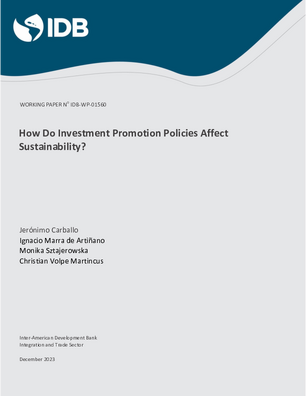How Do Investment Promotion Policies Affect Sustainability?
Date
Dec 2023
Sustainability has become an imperative. Understanding the effects of countries policies thereon has therefore acquired vital importance. This is particularly the case with ubiquitous policies such as investment promotion. In this paper, we address this timely policy question from an environmental perspective. We examine whether and how investment promotion policies affect Latin American economies emissions of pollutants. To do so, we create and use a unique dataset that combines data on multinational firms location, investment promotion agencies (IPAs) assistance, and pollutant-specific emission intensities across countries and sectors over time. Our analysis yields three main findings. First, multinational firms operating in Latin America have higher emission intensities than those located in Europe and that this is primarily driven by their sectoral distribution. Second, IPA client portfolios are biased toward more polluting multinational firms and this is mainly associated with the type of sectors targeted by the IPAs. Third, while on average the effects of IPA assistance are similar across multinational firms with different pollution levels, these are stronger on more polluting ones within
priority sectors. These findings highlight the need and relevance of data-based evidence to uncover potential tensions and balance different economic and sustainability goals.
priority sectors. These findings highlight the need and relevance of data-based evidence to uncover potential tensions and balance different economic and sustainability goals.




